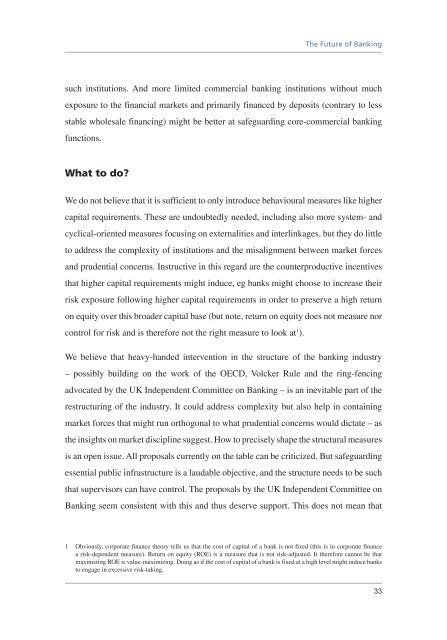Create successful ePaper yourself
Turn your PDF publications into a flip-book with our unique Google optimized e-Paper software.
The Future of Banking<br />
such institutions. And more limited commercial banking institutions without much<br />
exposure to the financial markets and primarily financed <strong>by</strong> deposits (contrary to less<br />
stable wholesale financing) might be better at safeguarding core-commercial banking<br />
functions.<br />
What to do?<br />
We do not believe that it is sufficient to only introduce behavioural measures like higher<br />
capital requirements. These are undoubtedly needed, including also more system- and<br />
cyclical-oriented measures focusing on externalities and interlinkages, but they do little<br />
to address the complexity of institutions and the misalignment between market forces<br />
and prudential concerns. Instructive in this regard are the counterproductive incentives<br />
that higher capital requirements might induce, eg banks might choose to increase their<br />
risk exposure following higher capital requirements in order to preserve a high return<br />
on equity over this broader capital base (but note, return on equity does not measure nor<br />
control for risk and is therefore not the right measure to look at1 ).<br />
We believe that heavy-handed intervention in the structure of the banking industry<br />
– possibly building on the work of the OECD, Volcker Rule and the ring-fencing<br />
advocated <strong>by</strong> the UK Independent Committee on Banking – is an inevitable part of the<br />
restructuring of the industry. It could address complexity but also help in containing<br />
market forces that might run orthogonal to what prudential concerns would dictate – as<br />
the insights on market discipline suggest. How to precisely shape the structural measures<br />
is an open issue. All proposals currently on the table can be criticized. But safeguarding<br />
essential public infrastructure is a laudable objective, and the structure needs to be such<br />
that supervisors can have control. The proposals <strong>by</strong> the UK Independent Committee on<br />
Banking seem consistent with this and thus deserve support. This does not mean that<br />
1 Obviously, corporate finance theory tells us that the cost of capital of a bank is not fixed (this is in corporate finance<br />
a risk-dependent measure). Return on equity (ROE) is a measure that is not risk-adjusted. It therefore cannot be that<br />
maximizing ROE is value-maximizing. Doing as if the cost of capital of a bank is fixed at a high level might induce banks<br />
to engage in excessive risk-taking.<br />
33














